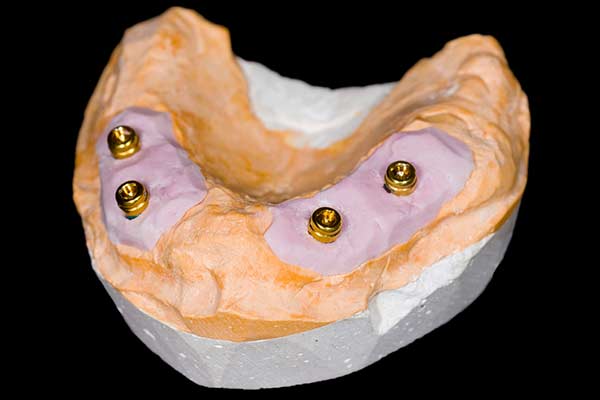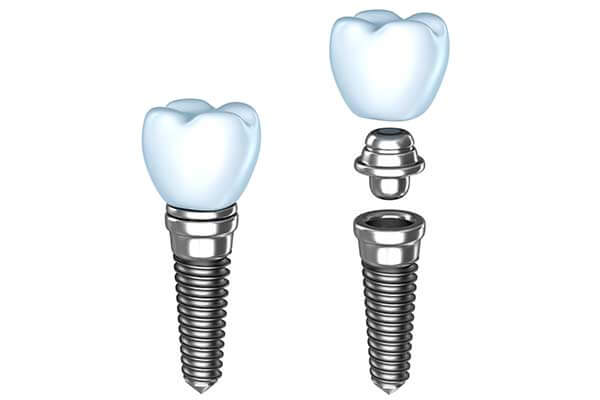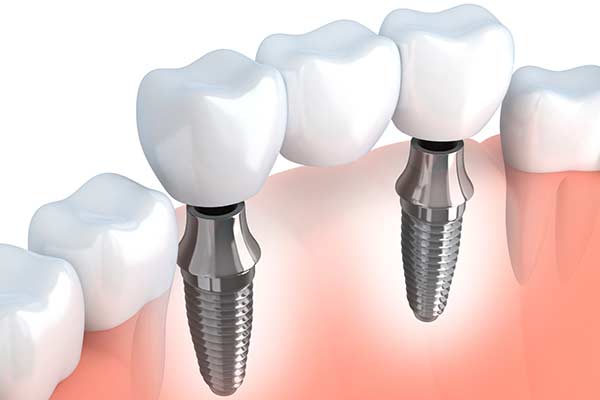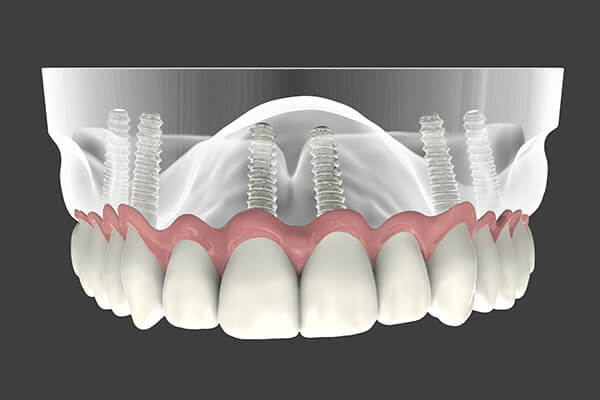Dental Implants in Huntersville
The Smile Architects provides implant dentistry in Huntersville, NC. Call 704-875-1621 to learn more and schedule your appointment.
Dental implants are the best solution for replacing missing teeth because they are the only option that replaces both the root and the crown of the tooth. By doing so, dental implants prevent and even reverse bone loss in the jaw. This results in a stable bite, a comfortable restoration that looks and feels natural, and a more youthful appearance.
Types of Dental Implant Restorations
The term “dental implants” is used to refer to a wide range of procedures and restorations supported by dental implants. The most common types of implant restorations have three parts: the dental implant itself (a post that is placed into your jaw to replace the root of your tooth), the restoration (a crown, bridge, or denture), and an abutment that serves to connect the two.
We offer the following dental implant restorations at The Smile Architects:

Full Mouth Supported Dental Implants
A full mouth restoration is performed when all or most of the teeth in the mouth are compromised. It may involve replacing all of the teeth with dental implants or a combination of dental implants and other restorative procedures. Full mouth restorations can dramatically improve patients’ quality of life and appearance, making it easier to eat, speak, and smile with confidence.

Single Tooth Dental Implants
A single-tooth dental implant involves an implant post, an abutment, and a crown. The crown can be made with your choice of material, although most patients choose a tooth-colored option like our CEREC restorations for a natural appearance. Single-tooth dental implants are used as an alternative to a dental bridge; unlike a bridge, they place no stress on adjacent teeth.

Implant Supported Bridges
When two or more adjacent teeth are missing, an implant-supported bridge can be used to replace them. Depending on your needs, implants may be used to replace each of the missing roots, or we may only replace the two outermost missing teeth with implants and use those as a support for your restoration.
What are the advantages of an implant supported bridge?
Because of the natural look and feel of the porcelain and the functional stability provided by the implants, implant supported bridges are an effective solution to replace multiple missing teeth.
A traditional bridge uses teeth on either side of the gap where teeth are missing for support. An implant supported bridge uses two or more dental implants rather than the adjacent teeth. When a bridge uses natural teeth for attachment, the natural teeth must be prepped for crowns and are then subject to increased stress which may be damaging - particularly if the existing tooth, roots, or surrounding bone structure are already compromised. A dental implant supported bridge replaced your missing teeth and avoids putting any additional stress on your natural teeth.

Implant Supported Dentures
Implant-supported dentures can be full or partial, fixed or removable. Dental implants give dentures more stability, eliminating the need for messy pastes or adhesives. This stability means your implant-supported dentures will never slip, fall out, or irritate your gums.
Why should I consider implant-supported dentures over traditional dentures?
This technique offers many advantages over traditional dentures.
Easy to care for, this solution can simulate the look and feel of natural teeth and stay fixed in place with the implants acting as anchors. Patients will not experience the typical rocking and movement or gum irritation associated with dentures.
Dental implant placement can also help alleviate the sunken look that can occur with bone loss in the jaw by stimulating bone growth in the area around the implant. This process can also help prevent future bone loss.
Frequently Asked Questions About Dental Implants
How painful is getting a dental implant?
Getting a dental implant is not painful at all. You will be given local anesthetic injections prior to your procedure to ensure that you don’t feel any discomfort while we work. In the hours after your appointment, the anesthetic will wear off and you are likely to feel some tenderness at the surgical site. This can be alleviated with over-the-counter pain medications and cold compresses, as well as a soft food diet.
Can you get a temporary tooth while waiting for an implant?
Yes, temporary restorations are available if you are getting a dental implant for a tooth that is visible when you smile. Ask us about your options during your consultation.
How long does it take for dental implants to heal?
Your soft tissues will heal shortly after your dental implant surgery—usually in about two weeks—but another healing process is taking place below the gum line. This process is called osseointegration and it occurs when your implants and your jawbone fuse together to create a stable base for your restorations. This can take up to 3 months.
Are dental implants covered by dental insurance?
Some insurance plans cover some aspects of dental implant surgery; others cover dental implants under certain circumstances. Your medical insurance may also pay a portion of the costs if your dental implants are needed as a result of a congenital condition, radiation treatment, or an accident. We can help you understand your benefits prior to scheduling your procedure.
Are you looking for a dentist in Huntersville, NC? Contact us today to schedule an appointment.
